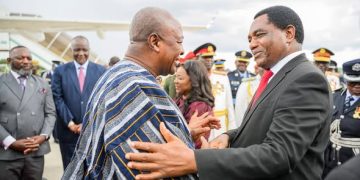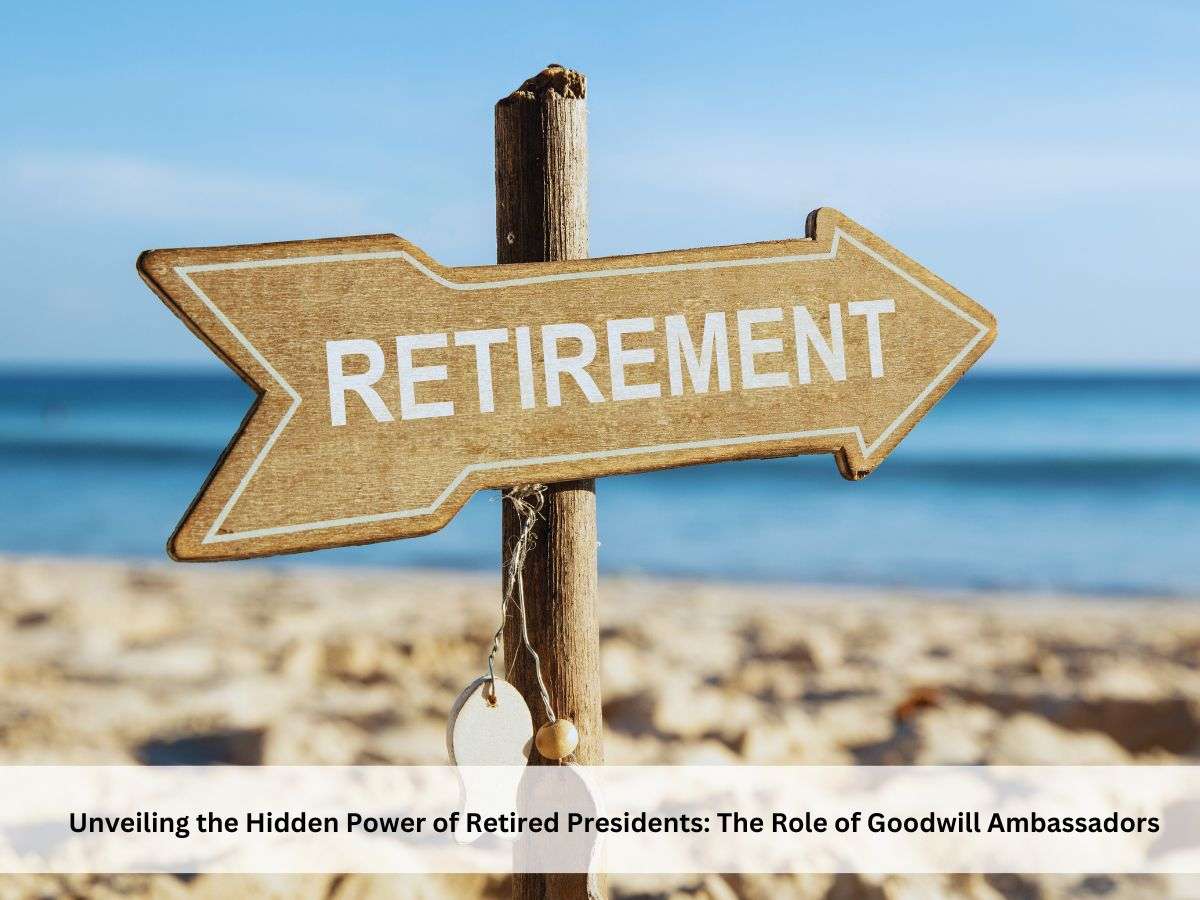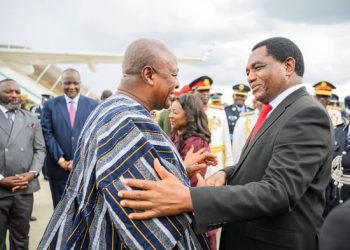By Guest Contributor
Melo Media, Thursday, 23rd November, 2023
Retired presidents hold a unique blend of influence, experience, and global recognition. They possess a hidden power that can be harnessed for the greater good: becoming goodwill ambassadors. These former leaders step into a new role, using their political legacy and networks to advocate for important causes, promoting peace, development, and humanitarian efforts around the world.
As influential figures, retired presidents can leverage their reputation to draw attention to pressing issues, mobilize resources, and inspire action. Their ability to garner media attention and access key decision-makers makes them invaluable and powerful allies in the fight against social injustices and global challenges, including poverty, climate change, and gender inequality.
The role of a goodwill ambassador provides retired presidents with a platform to continue making a positive impact long after their time in office. Through their involvement in various initiatives, these respected figures bring attention to critical issues that require urgent attention, fostering international collaboration and rallying support from governments, organizations, and individuals worldwide. By utilizing their extensive global networks, retired presidents become catalysts for change, contributing to a more inclusive and sustainable future.
In today’s interconnected world, international relations play a crucial role in addressing global challenges. Goodwill ambassadors, especially retired presidents, occupy a unique position in shaping international affairs. Their presence brings credibility and legitimacy to various initiatives, making them key players in promoting diplomacy, peacebuilding, and development.
Retired presidents-turned-goodwill ambassadors have the ability to transcend political boundaries and bring nations together. Their diplomatic skills, honed during their time in office, allow them to navigate complex international landscapes and bridge gaps between conflicting parties. By actively engaging with global leaders, retired presidents can foster dialogue and collaboration, leading to tangible solutions for pressing issues.
Furthermore, the role of goodwill ambassadors extends beyond traditional diplomacy. These influential figures have the power to mobilize resources, raise awareness, and inspire individuals to take action. The combination of their personal charisma, political legacy, and extensive networks enable them to reach a wide audience, amplifying the impact of their advocacy efforts and creating lasting change.
Retired presidents possess a unique blend of power and influence that sets them apart from other individuals. Their time in office allows them to accumulate a wealth of experience and knowledge, providing them with unparalleled insights into the inner workings of governments and international institutions. This expertise positions them as valuable assets in tackling complex global challenges.
Moreover, the global recognition that retired presidents enjoy gives them a platform to generate public interest and media attention. News outlets and journalists are often eager to cover their activities, amplifying their message and drawing attention to important causes. This media exposure not only raises awareness but also puts pressure on decision-makers to address the issues at hand.
Retired presidents also possess extensive networks, built over years of political engagement. These networks span across governments, nonprofit organizations, businesses, and academia, allowing them to connect with influential individuals and institutions around the world. By leveraging these connections, retired presidents can effectively advocate for change and mobilize resources to support meaningful initiatives.
Several retired presidents have successfully transitioned into the role of goodwill ambassadors, using their influence to make a difference in various areas. One notable example is Jimmy Carter, the 39th President of the United States. After leaving office, Carter founded the Carter Center, a nonprofit organization committed to advancing human rights and alleviating suffering worldwide. Through his work as a goodwill ambassador, Carter has played a significant role in eradicating diseases, promoting democracy, and mediating conflicts in different parts of the world.
Another inspiring example is Ellen Johnson Sirleaf, the former President of Liberia and the first elected female head of state in Africa. Following her presidency, Sirleaf became a goodwill ambassador for the United Nations, focusing on issues such as women’s empowerment, peacebuilding, and economic development. Her leadership and advocacy have been instrumental in advancing gender equality and inspiring the next generation of female leaders in Africa and beyond.
These examples demonstrate how retired presidents can leverage their influence and experience to make a meaningful impact as goodwill ambassadors. Their ability to navigate complex political landscapes, combined with their commitment to social justice, serves as an inspiration for others to follow in their footsteps.
Retired presidents have a wealth of experience and a vast network of contacts that can be leveraged to drive positive change. One way they can do this is by actively participating in international conferences, summits, and forums. By lending their expertise and insights to these platforms, retired presidents can contribute to policy discussions and shape the global agenda.
Another effective strategy is to establish or join existing organizations focused on specific causes. By becoming involved in these initiatives, retired presidents can use their networks to mobilize resources, raise funds, and advocate for change. They can also utilize their status to attract other influential figures to support and contribute to these efforts.
Furthermore, retired presidents can engage in public speaking engagements, delivering influential speeches that raise awareness and inspire action. Their ability to captivate audiences and articulate their vision makes them powerful advocates for important causes. By sharing their experiences and insights, they can motivate individuals to get involved and make a difference in their own communities.
While the role of a goodwill ambassador offers immense opportunities for retired presidents, it also comes with challenges and considerations. One major challenge is maintaining a balance between their advocacy work and their personal lives. Goodwill ambassadors often face demanding schedules and extensive travel, which can take a toll on their well-being and relationships.
Retired presidents must also navigate the potential conflicts of interest that may arise from their involvement in various initiatives. It is crucial for them to uphold ethical standards and ensure that their actions align with their values and the principles they stood for during their time in office.
Additionally, retired presidents must be prepared to face criticism and scrutiny as they step into their new role. Their actions and statements as goodwill ambassadors are closely scrutinized, and any misstep can have far-reaching consequences. It is essential for them to be mindful of their words and actions, remaining sensitive to cultural and political contexts.
Organizations play a critical role in supporting and utilizing retired presidents as goodwill ambassadors. They provide the necessary infrastructure, resources, and expertise to enable these influential figures to make a meaningful impact.
Organizations can collaborate with retired presidents to develop strategies and action plans for addressing specific issues. By aligning their goals and objectives, both parties can maximize their collective impact and drive positive change.
Furthermore, organizations can facilitate networking opportunities for retired presidents, connecting them with other influential individuals and institutions. These networks provide a platform for collaboration and knowledge-sharing, enabling retired presidents to leverage their expertise and make a more significant impact.
Moreover, organizations can provide ongoing support and guidance to retired presidents as they navigate their new role as goodwill ambassadors. This includes training, mentorship, and access to relevant resources to ensure that their efforts are effective and sustainable.
Becoming a goodwill ambassador as a retired president requires careful planning and strategic decision-making. Here are some steps that can be taken:
1. Identify the cause or issues that align with your values and expertise. Consider the areas where you can make the most significant impact based on your experience and knowledge.
2. Research and identify organizations that work on those causes and have established goodwill ambassador programs. Reach out to these organizations to express your interest in becoming involved.
3. Build relationships and networks within the organization. Attend events, conferences, and meetings to connect with key individuals who can support your efforts.
4. Develop a clear and compelling message that communicates your commitment to the cause and the value you bring as a retired president.
5. Leverage your existing networks to raise awareness and mobilize support for the cause. Engage with media outlets, give interviews, and utilize social media platforms to amplify your message.
6. Stay informed and up-to-date on the latest developments and research related to the cause. This will allow you to speak with authority and inspire confidence in your role as a goodwill ambassador.
7. Continuously evaluate and assess the impact of your efforts. Be open to feedback and adapt your approach as needed to maximize your effectiveness.
The impact of retired presidents as goodwill ambassadors can be seen in numerous success stories around the world. Their involvement has led to significant advancements in various areas, including peacebuilding, poverty alleviation, and sustainable development.
One notable success story is the work of Nelson Mandela, the former President of South Africa, who became a global symbol of reconciliation and peace. Mandela dedicated his post-presidential years to advocating for human rights, education, and HIV/AIDS prevention. His efforts undoubtedly contributed to the positive changes seen in South Africa and inspired a generation of leaders worldwide.
Another success story is the work of Mary Robinson, the former President of Ireland, who became a prominent advocate for climate justice. Through her role as a goodwill ambassador, Robinson has highlighted the disproportionate impact of climate change on vulnerable communities and called for urgent action to address this global crisis.
These success stories demonstrate the immense impact retired presidents can have as goodwill ambassadors. Their dedication, leadership, and ability to mobilize resources have led to tangible improvements in the lives of individuals and communities worldwide.








































